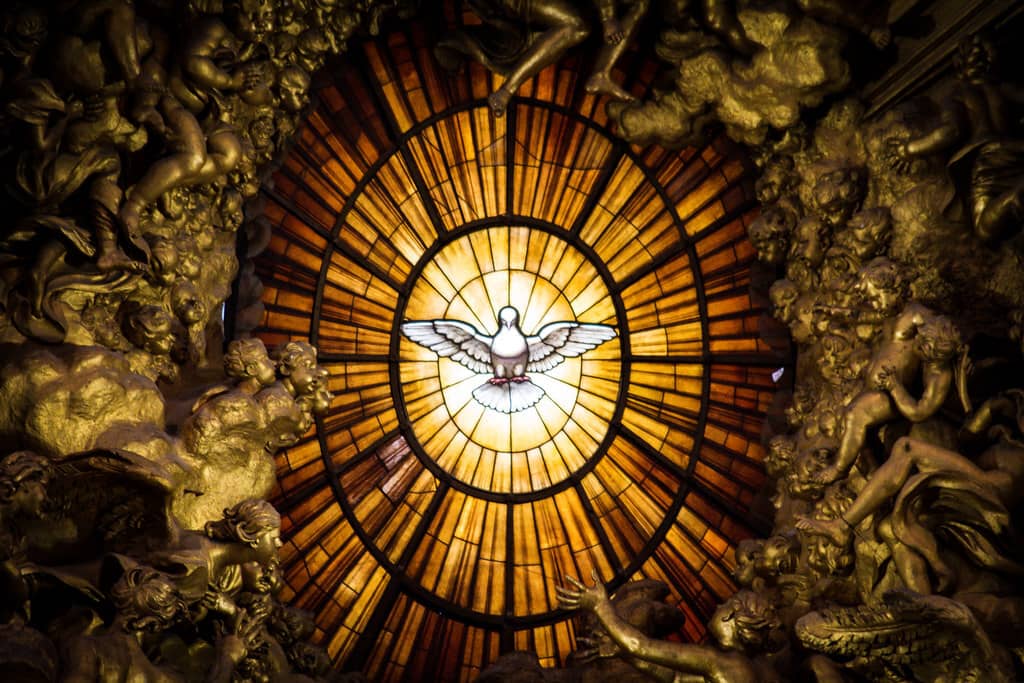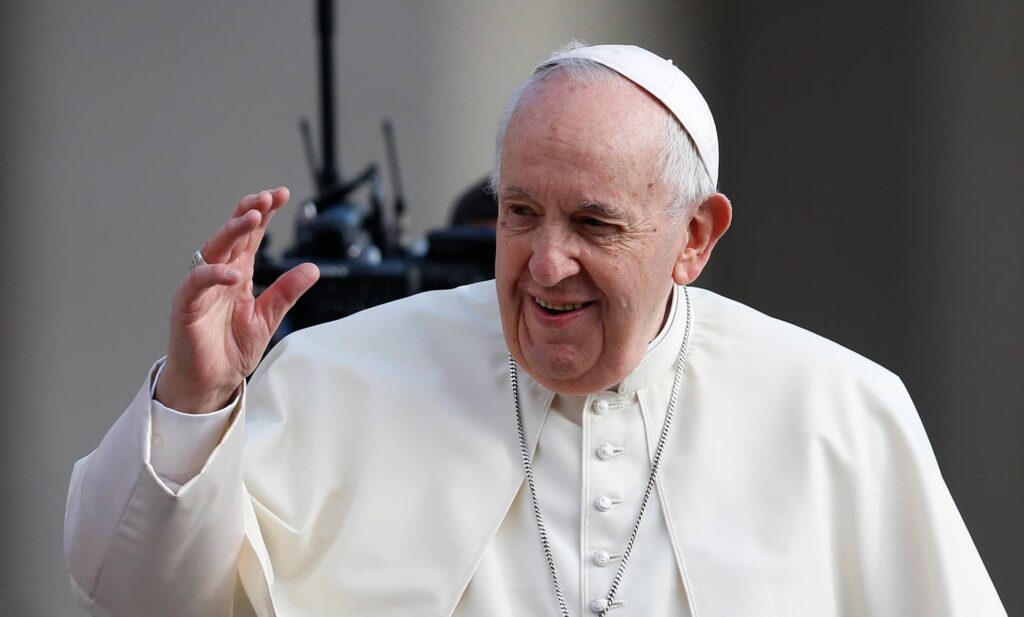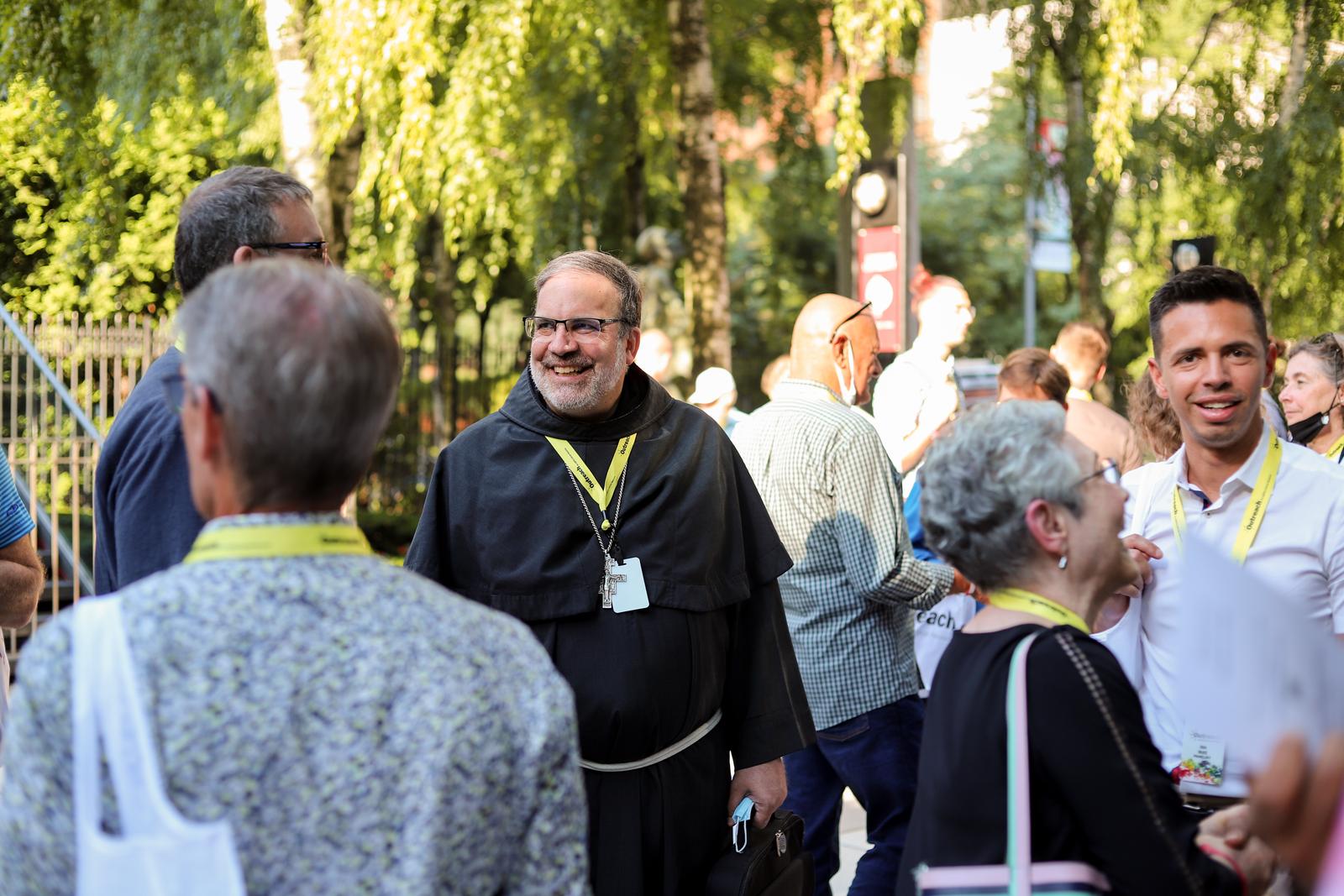Today marks a modest anniversary for Outreach: we launched our website one year ago today, on the Feast of Saint Joseph the Worker, our patron. Certainly a one-year anniversary is not as monumental as others celebrated in the Catholic world: America Media, our sponsor, has been around since 1909. On the other hand, a year’s passage is a good time to reflect on what we’ve learned and to engage in what we Jesuits call an examen, a review of where God has been active in the past.
So, let’s look at a few lessons learned and then give you a sense of where we hope we’re going.

1. The Holy Spirit is in charge
This is true for every Christian ministry, but for Outreach it seems especially true. Over the past year, our website, Outreach.faith, has grown into something none of us could have anticipated or even imagined—which I attribute to the guidance of the Holy Spirit. Here’s how it happened, and in this brief story I hope you can see the activity of the “God of surprises.”
In 2018, at the Vatican’s World Meeting of Families, in Dublin, I met dozens of LGBTQ Catholics and those who ministered to them from around the world. But it seemed that many didn’t know much about LGBTQ Catholic organizations in other countries. The same seemed true among some people in the United States.
So I thought it might be a good idea to host a conference that drew people and groups together, and America Media began to plan one for the summer of 2020. David Gibson, of Fordham University’s Center for Religion and Culture, our co-sponsor, suggested a name: Outreach.
Because of Covid, that year’s conference turned into a series of brief videos. The next year, also because Covid, the conference became a webinar. Ryan Di Corpo, a former O’Hare Fellow at America Media, helped out a great deal, and we then became a two-man team.
After that, we realized that future videos would need a home. Originally, I envisioned a website that would be mainly a clearinghouse, a repository for LGBTQ Catholic resources in various languages.
We brought in a team of web designers who created a website that went far beyond what we had imagined. It included a space for news and essays; a resource page for articles, videos, books from around the world and in multiple languages; and a section called “Gaudete,” where we could lift up parishes and schools that welcomed LGBTQ Catholics. As an added bonus, the website was also beautiful.
We launched on May 1, 2022, with over 300 resources contributed by dozens of advisors from the U.S. and abroad. Since then, we’ve published 150 original articles by over a hundred contributors, ranging from well-known scholars and theologians and internationally recognized experts to LGBTQ high school students relating their experiences of the church and of God. We often hear from our readers that they would not have known some of these perspectives unless they’d found them on Outreach.
Today, Outreach.faith includes many features we’ve added along the way, including our Outreach Guide to the Bible and Homosexuality and our Outspoken series of monthly conversations. Our first in-person conference was a hit (and another one is coming up next month). And thousands of people now receive our weekly Sunday Gospel reflections.
We’re grateful to all our many contributors, supporters and friends. But we’re even more grateful to the Holy Spirit’s guidance throughout this process, which has brought us to a place that I could have never imagined.

2. LGBTQ Catholics want solid theology
A few months ago, I asked one of the great biblical scholars of our time, Walter Brueggemann, who had made some positive comments about LGBTQ people, if he would write a piece on how LGBTQ people could read the Bible.
As most people know, there are a few Bible verses about homosexuality that, even though they were written for a vastly different historical context, are used to condemn, reject and exclude LGBTQ people. To take one obvious example, even though it’s in the Old Testament, we don’t kill people for working on the Sabbath (Ex. 35:2).
But when it comes to homosexuality, many Catholics suddenly become literalists. At the same time, many biblical verses about welcome and inclusion are either ignored or not well known. I thought that Walter Brueggemann could help people understand all this. But I didn’t have much hope that this august scholar would say yes.
Instead, a few days later, he sent us his brilliant essay, “How to read the Bible on homosexuality,” which has become our most popular piece ever, having garnered almost 100,000 page views. (It exceeds even the number of views that letters from Pope Francis have gotten.)
We plan to continue helping people understand Scripture and Catholic theology by asking the best scholars to contribute to Outreach, since there is a clear desire for these pieces.
That led us to ask other top-notch Biblical scholars—including Amy-Jill Levine; John R. Donahue, S.J.; Harold W. Attridge and the late Thomas Stegman, S.J.—to write on the same topic, with different emphases. Their articles also proved extremely popular.
In response, we gathered them together, along with several other pieces, as the Outreach Guide to the Bible and Homosexuality. We plan to continue helping people understand Scripture and Catholic theology by asking the best scholars to contribute to Outreach, since there is a clear desire for these pieces. We even have a few more articles on the Bible in store.

3. Transgender Catholics need our support
In just the last year, the targeting of transgender people, mainly in the political sphere, but also in the religious world, has increased dramatically. When we began Outreach, we knew that we wanted to minister to this at-risk group.
One way has been to highlight the stories of transgender Catholics, like that of Christine Zuba, a Eucharistic minister at her parish. (Christine, pictured above, served on a panel at our conference last year on the transgender experience.)
More recently, we published a heartfelt letter from a young transgender person to the church he loves so much. We’ve highlighted the Catholics sisters who work with trans people around the world: Sister Luisa Derouen in the United States; Sister Monica Astorga in Argentina; Sister Prema Chowallur in India; and Sister Genevieve Jeanningros in Italy. (Sisters always lead the way in the church, don’t they?)
Finally, we’ve looked at some directives from various dioceses on gender issues, and, thanks to two moral theologians James Bretzke, SJ, and Charles Bouchard, OP, we’ve studied the the recent U.S.C.C.B. document on transgender healthcare directives.
The amount of vitriol directed at transgender people and the cruel things some Catholics say about them astonishes me. Of course, there are still many questions about the origins and medical treatment of this phenomenon, especially among youth. But before the church teaches it needs to listen—to psychiatrists, psychologists, physicians, social scientists, biologists and, especially, transgender people themselves. Overall, this is a group that Outreach wants to accompany, listen to and advocate for, especially since so few others in the church seem to be doing so.

4. There is still a great deal of homophobia in our church
You won’t find any homophobia on Outreach, other than people writing about it. We don’t allow homophobic comments to be posted and, thankfully, we don’t get very many. Where you will see evidence of homophobia is in the social media responses to some of our articles, especially those that deal with transgender people, any aspect of same-sex marriage or Pride month.
Even though I’m clear about not challenging church teaching, I still face a great deal of hatred online and receive a constant stream of hate mail. I have been called every name you can imagine: heretic, apostate, wolf in sheep’s clothing, false priest, homo-heretic, as well as pretty much all of the slurs directed towards LGBTQ people. (I’ll spare you the list).
This doesn’t mean that everything we publish is immune to criticism, much less perfect; we always welcome thoughtful responses. (That’s one reason we have a comments section after each article.)
Before the church teaches on the transgender experience, it needs to listen to psychiatrists, psychologists, physicians, social scientists, biologists, and especially, transgender people themselves.
But many of the responses are simply excuses to spew hatred and homophobia (and transphobia). If anything, such attacks inspire us in our efforts to minister to a community that faces that kind of hatred. During his public ministry, Jesus consistently stood with those on the margins in any way. Jesus stood with, as we Jesuits say, “the excluded.” That’s where we want to stand, too.

5. Things are getting better
In just the last year, LGBTQ Catholics have seen great progress. Just consider three notable developments.
First is the Holy Father’s historic stance against the criminalization of homosexuality. This may seem obvious to people in most Western nations, but it poses a decided challenge in several countries where same-sex relations is punishable by death, and in the roughly 70 countries where it is a criminal offense that can lead to imprisonment. (Pope Francis also clarified his comments on decriminalization with a special letter to Outreach.)
Second, a number of cardinals, archbishops and bishops have called for the church to reconsider terming homosexual acts as “intrinsically disorder” in the Catechism, which LGBTQ people often say is one of the biggest stumbling blocks to feeling welcome in their church. These include Cardinal Robert W. McElroy of San Diego, Cardinal Blase Cupich of Chicago, Cardinal Jean-Claude Hollerich, S.J., of Luxembourg and Bishop John Stowe of Lexington, Ky.
Finally, to the surprise of many, the latest working document from the Synod mentioned the need to welcome LGBTQ people in the church. When I was in Rome last November, someone who helped with the Synod report told me that half of all diocesan documents from around the world referenced LGBTQ issues. These are all decided steps forward.
6. For LGBTQ Catholics, it’s often two steps forward, one step backward
In some places, things have gotten worse for LGBTQ Catholics. The publication of directives from some U.S. dioceses severely restricting the participation of transgender people in the church, was detailed in Outreach in a series of articles by David Palmieri. These new documents have made many transgender people feel like they have not been listened to by their own church. And in too many places across the world, LGBTQ Catholics as a whole still feel marginalized in their own church.
What’s next?
Our next LGBTQ Catholic Ministry Conference is scheduled for June in New York City. Our series of Outspoken conversations will continue; we have an upcoming online art project called “LGBTQ Catholic Heroes”; we’re planning more Outreach Guides, like our series on the Bible; and we will feature more top-notch scholars on our site to write on theological topics like the role of conscience in the moral lives of LGBTQ people.
A number of cardinals, archbishops and bishops have called for the church to reconsider terming homosexuality an “intrinsic disorder” in the Catechism.
And thanks to our web designing team, we’ve just streamlined our website, which you’ll see today. The updated website a lot easier to navigate, with more current articles visible, and links to features like the Outreach Guides and Outspoken. Also, Ryan Di Corpo begins with us full time today, as Managing Editor, after completing his master’s degree in journalism at Northeastern University.
What else is on the horizon? Well, here I’m reminded of a response from Servant of God Pedro Arrupe, S.J., the former Jesuit superior general, who was once asked by a journalist, “Where is the Society of Jesus going?”
His response—“I have no idea!”—upset more than a few Jesuits present.
Father Arrupe meant that the Holy Spirit is in charge. So we pray and trust that the Spirit will continue to guide us as well. Please pray with us! And today, on our anniversary, consider supporting us financially, too.
As ever, it’s good to remember that you are welcome here. And God loves you!



